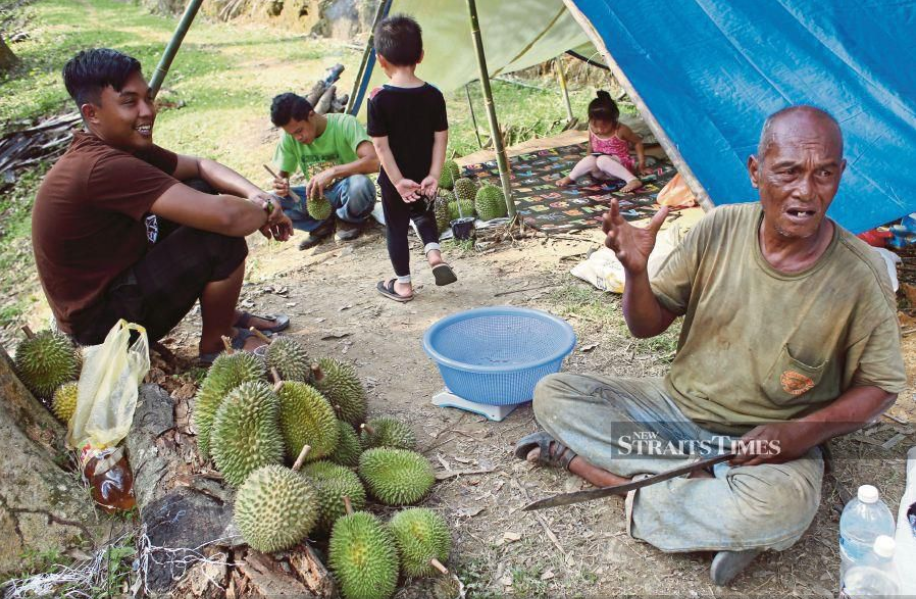A durian story: Gamble pays off for Felda settler

PEKAN: Uncertainty in oil palm prices in 1984 saw settler Ismail Sabri growing durian on his land in Felda Chini 3, near here.
Ismail, 60, planted durian kampung on 0.8ha.
The father of four has 65 durian trees and during each harvest, he can earn thousands of ringgit.
He even has enough durian to give to his friends and relatives.
“In the 1980s, the government had yet to mark the border for Felda plots.
“Many settlers were worried that if they planted other crops other than oil palm, someone else would reap the benefits when the (oil palm) trees matured.
“Since oil palm prices were unstable, I decided to take a risk and plant durian on a 0.8ha plot,” he said, adding that he started harvesting the fruits in 1991.
He said with guidance from elderly villagers, he managed to find a suitable fertiliser and cultivation formula so that the trees continued to produce high-quality fruits.
He said sales from the fruits were enough to support his family, and they helped him these days when oil palm prices were uncertain.
“It is a move that has paid off. Now, I have a stable income and my family can enjoy the fruits.
“Sometimes friends will drop by my plantation. I will offer them four durians for RM20. But there are also people who
enter the farm at night to steal the durian. My second son helps me keep watch.”
Ismail said his concept (planting durian besides oil palm) was similar to the one proposed by Prime Minister Tun Dr Mahathir Mohamad during the recent Felda Settlers Day celebration in Felda Selancar 3, Rompin.
“Durian is a suitable alternative crop as it is always high in demand. Proper guidance will enable more settlers to venture into durian farming... they will not regret it.”
In Raub, the popularity of the orchard-grown Musang King durian over the last few years has taken the local tourism industry by storm, as visitors throng the town to get a taste of it.
Gone are the days when durian orchard owners struggled to market the odorous and thorny fruits.
These days, durian stalls are mushrooming in the district and nearby areas.
The recent move by the Agriculture and Agro-based Ministry to export frozen whole durian to China has resulted in an increase in demand for the Musang King.
The sole company from Pahang — PHG Ever Fresh Food (M) Sdn Bhd — which is among five outfits in Malaysia given the
green light to export the fruit to China, has its hands full meeting orders.
One of the company’s partners, Lye Wee Tin, said the factory previously only exported frozen whole durian in the form of pulp and paste, but starting this year, the entire fruit was sent to China.
“The people in China can buy the whole fruit and this is good in terms of hygiene and safety.
“In future, more companies from Raub may be involved due to the growing demand.”
He said the company had to date exported about 50 tonnes of durian to China through two methods — vacuum pack and
frozen whole durian — in special boxes that were loaded into containers.
“Only Musang King durian from Malaysian Good Agricultural Practice-certified farms are processed for export.
“Durian farmers attach wide nets from tree to tree to collect the falling fruits. There is a huge demand for this variety and the supply is insufficient.
“We purchase the fruits for between RM26 and RM38 per kilogramme from farmers before cleaning, grading and sorting
them for packing. Raub produces about 40 per cent of the fruits exported to China. We expect the season to end in
October."
Lye said durian had a huge following in China, including in Shenzhen, Beijing, Shanghai, Chengdu, Nanning and Chongqing.
It was reported that the Agriculture Department had registered 204 varieties of durian, 12 of which had good commercial value and strong demand.
The six popular varieties are D24, D160 (Musang Queen), D168 (Hajah Hasmah), D197 (Musang King), D200 (Ochee) and
D 9 9.
The D197 and D24 are categorised as premium varieties.
